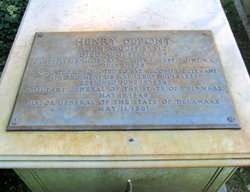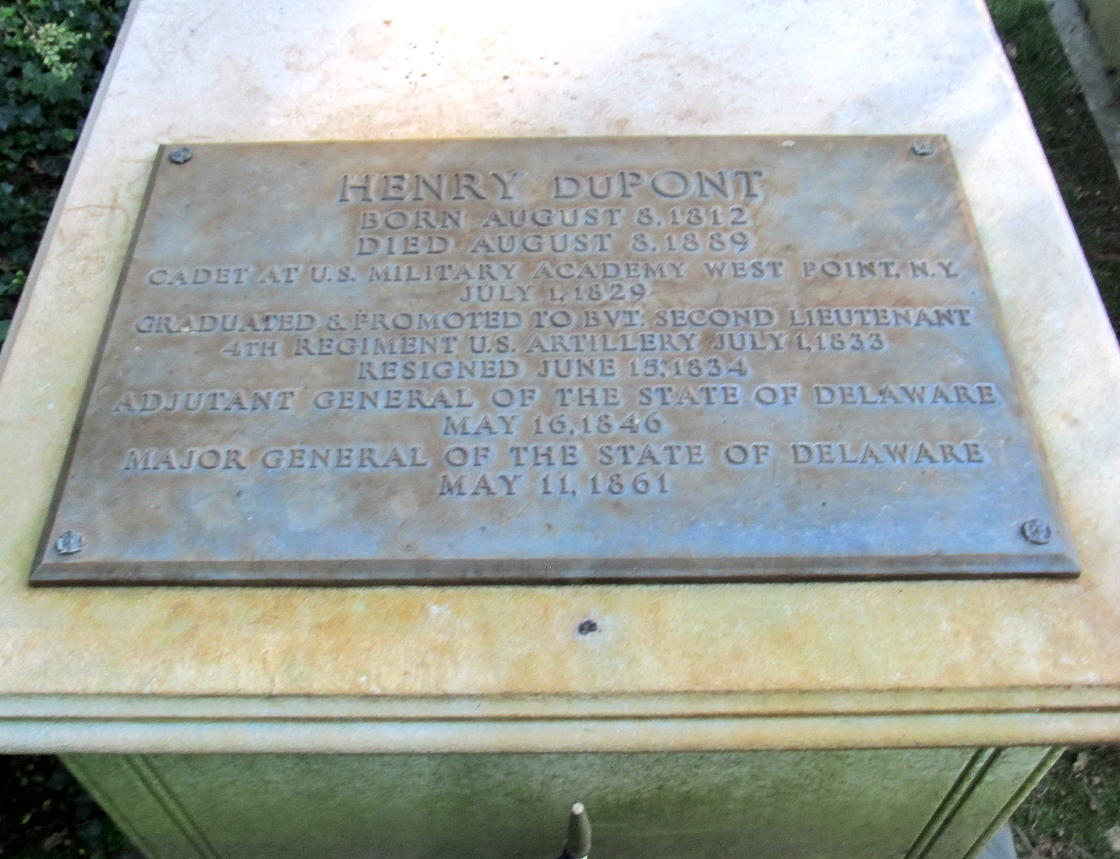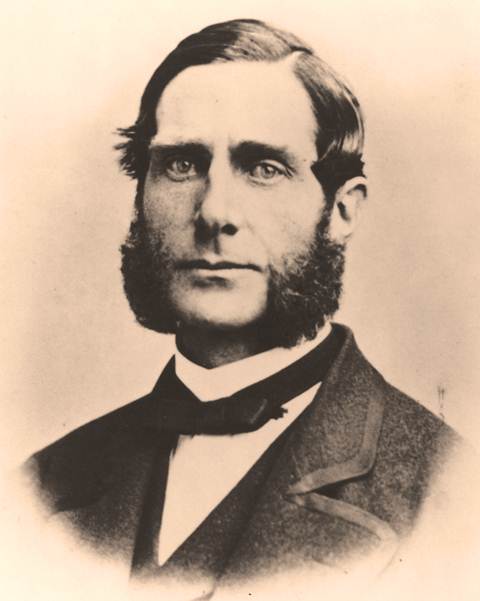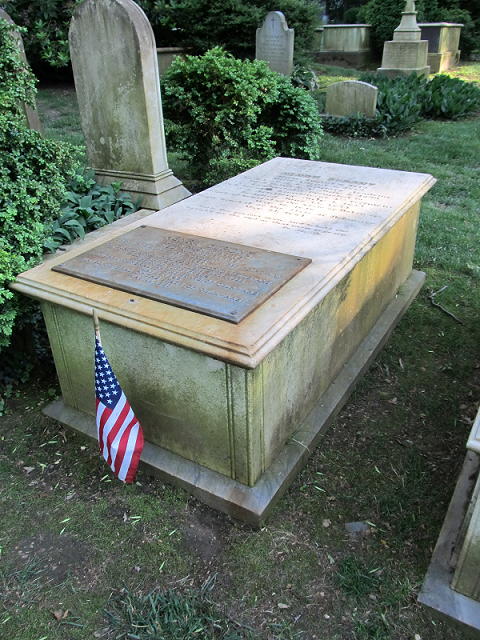USMA Class of 1833. Cullum No. 727.
He was the son of Eleuthere I. DuPont and Sophie Dalmas DuPont.
On July 15, 1837 as Henry Dupont, he married Louisa Gerhard at St. Paul's Episcopal Church at Chester, Delaware County, Pennsylvania.
They were the parents of eight children.
The New York Tribune Friday, August 9, 1889
Obituary
General Henry Dupont
Wilmington, Delaware, August 8. General Henry Dupont, since 1850 head of the extensive gunpowder manufacturing firm of F.I. Dupont de Nemourse & Co., died here early this morning. He was prostrated by an attack of heart failure about two months ago, from which he rallied temporarily, but grew worse again a few days ago.
Henry Dupont was born, of French parents, in the same house in which he died, near Wilmington, Delaware, on August 8, 1812. He was educated in a French school at Philadelphia and afterward at West Point, being graduated from the latter institution in 1833. After brief military service he resigned his commission in June 1834 and entered the important gunpowder factory which his father had established on the Brandywine River. A few months later his father died and Henry Dupont and his elder brother, Albert, were left proprietors of the mill. Albert Dupont retired on account of ill health in 1850, since which time Henry Dupont has been at the head of the establishment. The Dupont mill had furnished all the American powder in the War of 1812 and most of that used in the Mexican War. England and France purchased a goodly share of their supplies there in the Crimean War and in other campaigns beyond the sea the Dupont powder has done much deadly work. During the War of the Rebellion in this country the Federal Government was, of course, a large and constant patron of the works.
Although he resigned his second lieutenancy in 1834, Mr. Dupont soon drifted back into military relations. In 1841 he was on the staff of the Governor of Delaware and from 1846 to 1861 was Adjutant-General of the State troops. In May of the latter year he was made Major-General of the State troops. He at once assumed absolute control of the militia and ordered that every military organization in the State should immediately enter the Federal service and that every individual member thereof should take the oath of allegiance to the Federal Government under pain of summary expulsion from the service. This angered the Bourbon Democrats and every possible influence was brought to bear against General Dupont; but in vain. They even organized an insurrection against him; but the leaders of it were quickly clapped into jail. General Dupont thus rendered great services to the nation and he held his commission until the restoration of peace, resigning it in August 1866. As might be supposed from the above record, he was at first a Whig and then an earnest Republican. His first vote was for Henry Clay, his last for Benjamin Harrison. He was a Republican candidate for Presidential elector in 1868, 1876, 1880 and 1888. He was, of course, a strong advocate of the American system of protection. In addition to his great manufacturing interests, he devoted much attention to agriculture, having 2,000 acres of the finest farm land in the State. His wealth was estimated at $15,000,000.
He was married fifty-two years ago to Louisa Gebhard, of Philadelphia, who survives him. Six of their eight children are living: Colonel Henry A. Dupont, President of the Wilmington and Northern Railroad; William Dupont, of Wilmington; Mrs. Ellen E. Irving of Wilmington; Mrs. Victorine E. Foster; Mrs. Sophie M. Chandler, of Philadelphia and Miss Evelina Dupont. The two sons are now at the head of the powder works firm.
Twenty-First Annual Reunion Of The Association of the Graduates Of The United States Military Academy, At West Point, New York, June 12th, 1890
Saginaw, Michigan, Evening News Printing and Binding House, 1890.
Henry DuPont
No. 727. Class Of 1833
Died, August 8, 1889, near Wilmington, Delaware, aged 77.
Major-General Henry Du Pont was born August 8, 1812, in the family homestead, near Wilmington, Delaware, where, on the seventy-seventh anniversary of his natal day, he died full of years and full of honors. He was the second son of Eleuthere Irenee Du Pont de Nemours, a distinguished Frenchman, who, in 1800, sought an asylum in the United States from Jacobin persecution and founded the famous powder-works on the banks of the Brandywine River. Young Du Pont, at the age of eleven, entered the Mount Airey Military School at Germantown, Pennsylvania, then conducted by Colonel Roumfort, a graduate of the Military Academy, of the Class of 1817. From here he was sent to West Point in 1829 and upon his graduation was promoted, July 1, 1833, to the Fourth Artillery, with which he served till he resigned from the Army, June 15, 1834, to assist his father and elder brother in the manufacture of gunpowder. Upon the death of his father soon after, a large share of the responsibility in the management of these, the most extensive powder-works in the country, fell upon this young man of twenty-six. How he acquitted himself of this onerous task and of other important trusts is told in an obituary notice written by his friend, Fred. C. Bach Esq., of which we make a summary. Du Pont, in 1850, owing to the ill-health of his older brother, assumed the chief direction of the powder-works and from that year till his death his was the guiding and decisive mind in all matters of administration. From a capacity of two thousand pounds a day during the second war with Great Britain, at which period they were the sole source of supply of the American Army, the daily output was enlarged to fully twenty times that amount. The product of the Brandywine mills has been an important factor in every American war since the Revolution and likewise in several European conflicts, notably the formidable struggle in the Crimea, when large cargoes of Du Pont powder were shipped for the use of the allied armies. During the War of the Rebellion the company, at the request of President Lincoln, sent one of its members to Europe to make purchases for the Union Army. The firm kept abreast of the powder manufacturing of the world and in all its enterprises General Du Pont was the dominating spirit. He proved equal to every hazardous demand of his business and it is said of him that no man, perhaps, ever accomplished more for himself and his associates with less business exaction. Enterprise, courage, fair dealing and liberality were the characteristics of his business life.
General Du Pont's diversion was agriculture. He was probably the most extensive land owner in Delaware and his holding was the most valuable in the State. During the later years of his life his recreation consisted almost entirely in driving over his vast estate, inspecting crops and stock and planning improvements. The miles of well cultivated fields along the banks of the Brandywine were his pride and pleasure and he spent thousands of dollars in enriching and improving them.
In politics General Du Pont was a Republican and in years and honors the foremost member of his party in the State of Delaware. Without taste or ambition for political life and repeatedly declining offers of nomination or appointment in the good old Whig days when he belonged to the dominant party in Delaware, he nevertheless served as inspector of elections and challenger at the polls on numerous occasions and was a Presidential Elector in 1868,1876,1880, 1884 and 1888. He held cordial and life-long relations with Henry Clay, for whom his first vote was cast, in 1836, against Martin Van Buren. In 1860, in accordance with his conservative tendencies, General Du Pont voted for Bell and Everett, but the election of Abraham Lincoln was the signal for his heartiest support of the Republican Party.
General Du Pont's military services in behalf of the State of Delaware and the Union were conspicuous. He served as Aide-decamp on the staff of Gov. William B. Cooper in 1841 and as Adjutant-General of the State for fifteen years from 1846, or until the breaking out of the Civil War, when he was appointed Major-General of Delaware militia by Gov. William Burton, which position General Du Pont accepted on the express condition that he should have absolute control of all the armed troops in the State. He ordered that every company should forthwith be mustered into the United States service and every man subscribe to the oath of allegiance to the Federal Government and that all who declined taking the required oath should be deprived of their arms. This action created great consternation, which was heightened by Governor Burton suspending General Du Pont's order. But prompt action on the part of the Government nipped the incipient conspiracy of secession in the bud, a number of the leaders being arrested and sent to the prisoners' camp at Baltimore. General Du Pont resigned his commission as Major-General, August 20, 1866. He was a member of the Board of Visitors to the United States Academy at West Point in 1850.
Colonel Henry A. Du Pont, who graduated from the Military Academy at the head of his class in May 1861 and did gallant service in the War of the Rebellion, was the eldest son of General Du Pont. Rear Admiral S.F. Du Pont, United States Navy, who was so distinguished in the Civil War at Port Royal and Charleston, was the brother of the General.
A life-long friend says of our departed brother and much cherished classmate: His debtors, as well as his creditors, were always glad to see Henry Du Pont. He was a gentleman of the old school and whether in the office or in the drawing-room he was uniformly urbane and cordial. He attended scrupulously day by day to the smallest detail of his vast business and there he came in contact with a great many and with all kinds and classes of persons and all bear testimony to his gentle and engaging manners, his unfailing consideration and his hearty sincerity.
Perhaps a gentleman says Thackeray, is a rarer man than some of us think for. Which of us can point out many such in his circle, men whose aims are generous, whose truth is constant and not only constant in its kind but elevated in its degree; whose want of meanness makes them simple, who can look the world honestly in the face with an equal manly sympathy for the great and the small? Unhesitatingly we point to General Henry Du Pont as fulfilling all these high requisites.
George W. Cullum,
Brevet Major-General United States Army.
USMA Class of 1833. Cullum No. 727.
He was the son of Eleuthere I. DuPont and Sophie Dalmas DuPont.
On July 15, 1837 as Henry Dupont, he married Louisa Gerhard at St. Paul's Episcopal Church at Chester, Delaware County, Pennsylvania.
They were the parents of eight children.
The New York Tribune Friday, August 9, 1889
Obituary
General Henry Dupont
Wilmington, Delaware, August 8. General Henry Dupont, since 1850 head of the extensive gunpowder manufacturing firm of F.I. Dupont de Nemourse & Co., died here early this morning. He was prostrated by an attack of heart failure about two months ago, from which he rallied temporarily, but grew worse again a few days ago.
Henry Dupont was born, of French parents, in the same house in which he died, near Wilmington, Delaware, on August 8, 1812. He was educated in a French school at Philadelphia and afterward at West Point, being graduated from the latter institution in 1833. After brief military service he resigned his commission in June 1834 and entered the important gunpowder factory which his father had established on the Brandywine River. A few months later his father died and Henry Dupont and his elder brother, Albert, were left proprietors of the mill. Albert Dupont retired on account of ill health in 1850, since which time Henry Dupont has been at the head of the establishment. The Dupont mill had furnished all the American powder in the War of 1812 and most of that used in the Mexican War. England and France purchased a goodly share of their supplies there in the Crimean War and in other campaigns beyond the sea the Dupont powder has done much deadly work. During the War of the Rebellion in this country the Federal Government was, of course, a large and constant patron of the works.
Although he resigned his second lieutenancy in 1834, Mr. Dupont soon drifted back into military relations. In 1841 he was on the staff of the Governor of Delaware and from 1846 to 1861 was Adjutant-General of the State troops. In May of the latter year he was made Major-General of the State troops. He at once assumed absolute control of the militia and ordered that every military organization in the State should immediately enter the Federal service and that every individual member thereof should take the oath of allegiance to the Federal Government under pain of summary expulsion from the service. This angered the Bourbon Democrats and every possible influence was brought to bear against General Dupont; but in vain. They even organized an insurrection against him; but the leaders of it were quickly clapped into jail. General Dupont thus rendered great services to the nation and he held his commission until the restoration of peace, resigning it in August 1866. As might be supposed from the above record, he was at first a Whig and then an earnest Republican. His first vote was for Henry Clay, his last for Benjamin Harrison. He was a Republican candidate for Presidential elector in 1868, 1876, 1880 and 1888. He was, of course, a strong advocate of the American system of protection. In addition to his great manufacturing interests, he devoted much attention to agriculture, having 2,000 acres of the finest farm land in the State. His wealth was estimated at $15,000,000.
He was married fifty-two years ago to Louisa Gebhard, of Philadelphia, who survives him. Six of their eight children are living: Colonel Henry A. Dupont, President of the Wilmington and Northern Railroad; William Dupont, of Wilmington; Mrs. Ellen E. Irving of Wilmington; Mrs. Victorine E. Foster; Mrs. Sophie M. Chandler, of Philadelphia and Miss Evelina Dupont. The two sons are now at the head of the powder works firm.
Twenty-First Annual Reunion Of The Association of the Graduates Of The United States Military Academy, At West Point, New York, June 12th, 1890
Saginaw, Michigan, Evening News Printing and Binding House, 1890.
Henry DuPont
No. 727. Class Of 1833
Died, August 8, 1889, near Wilmington, Delaware, aged 77.
Major-General Henry Du Pont was born August 8, 1812, in the family homestead, near Wilmington, Delaware, where, on the seventy-seventh anniversary of his natal day, he died full of years and full of honors. He was the second son of Eleuthere Irenee Du Pont de Nemours, a distinguished Frenchman, who, in 1800, sought an asylum in the United States from Jacobin persecution and founded the famous powder-works on the banks of the Brandywine River. Young Du Pont, at the age of eleven, entered the Mount Airey Military School at Germantown, Pennsylvania, then conducted by Colonel Roumfort, a graduate of the Military Academy, of the Class of 1817. From here he was sent to West Point in 1829 and upon his graduation was promoted, July 1, 1833, to the Fourth Artillery, with which he served till he resigned from the Army, June 15, 1834, to assist his father and elder brother in the manufacture of gunpowder. Upon the death of his father soon after, a large share of the responsibility in the management of these, the most extensive powder-works in the country, fell upon this young man of twenty-six. How he acquitted himself of this onerous task and of other important trusts is told in an obituary notice written by his friend, Fred. C. Bach Esq., of which we make a summary. Du Pont, in 1850, owing to the ill-health of his older brother, assumed the chief direction of the powder-works and from that year till his death his was the guiding and decisive mind in all matters of administration. From a capacity of two thousand pounds a day during the second war with Great Britain, at which period they were the sole source of supply of the American Army, the daily output was enlarged to fully twenty times that amount. The product of the Brandywine mills has been an important factor in every American war since the Revolution and likewise in several European conflicts, notably the formidable struggle in the Crimea, when large cargoes of Du Pont powder were shipped for the use of the allied armies. During the War of the Rebellion the company, at the request of President Lincoln, sent one of its members to Europe to make purchases for the Union Army. The firm kept abreast of the powder manufacturing of the world and in all its enterprises General Du Pont was the dominating spirit. He proved equal to every hazardous demand of his business and it is said of him that no man, perhaps, ever accomplished more for himself and his associates with less business exaction. Enterprise, courage, fair dealing and liberality were the characteristics of his business life.
General Du Pont's diversion was agriculture. He was probably the most extensive land owner in Delaware and his holding was the most valuable in the State. During the later years of his life his recreation consisted almost entirely in driving over his vast estate, inspecting crops and stock and planning improvements. The miles of well cultivated fields along the banks of the Brandywine were his pride and pleasure and he spent thousands of dollars in enriching and improving them.
In politics General Du Pont was a Republican and in years and honors the foremost member of his party in the State of Delaware. Without taste or ambition for political life and repeatedly declining offers of nomination or appointment in the good old Whig days when he belonged to the dominant party in Delaware, he nevertheless served as inspector of elections and challenger at the polls on numerous occasions and was a Presidential Elector in 1868,1876,1880, 1884 and 1888. He held cordial and life-long relations with Henry Clay, for whom his first vote was cast, in 1836, against Martin Van Buren. In 1860, in accordance with his conservative tendencies, General Du Pont voted for Bell and Everett, but the election of Abraham Lincoln was the signal for his heartiest support of the Republican Party.
General Du Pont's military services in behalf of the State of Delaware and the Union were conspicuous. He served as Aide-decamp on the staff of Gov. William B. Cooper in 1841 and as Adjutant-General of the State for fifteen years from 1846, or until the breaking out of the Civil War, when he was appointed Major-General of Delaware militia by Gov. William Burton, which position General Du Pont accepted on the express condition that he should have absolute control of all the armed troops in the State. He ordered that every company should forthwith be mustered into the United States service and every man subscribe to the oath of allegiance to the Federal Government and that all who declined taking the required oath should be deprived of their arms. This action created great consternation, which was heightened by Governor Burton suspending General Du Pont's order. But prompt action on the part of the Government nipped the incipient conspiracy of secession in the bud, a number of the leaders being arrested and sent to the prisoners' camp at Baltimore. General Du Pont resigned his commission as Major-General, August 20, 1866. He was a member of the Board of Visitors to the United States Academy at West Point in 1850.
Colonel Henry A. Du Pont, who graduated from the Military Academy at the head of his class in May 1861 and did gallant service in the War of the Rebellion, was the eldest son of General Du Pont. Rear Admiral S.F. Du Pont, United States Navy, who was so distinguished in the Civil War at Port Royal and Charleston, was the brother of the General.
A life-long friend says of our departed brother and much cherished classmate: His debtors, as well as his creditors, were always glad to see Henry Du Pont. He was a gentleman of the old school and whether in the office or in the drawing-room he was uniformly urbane and cordial. He attended scrupulously day by day to the smallest detail of his vast business and there he came in contact with a great many and with all kinds and classes of persons and all bear testimony to his gentle and engaging manners, his unfailing consideration and his hearty sincerity.
Perhaps a gentleman says Thackeray, is a rarer man than some of us think for. Which of us can point out many such in his circle, men whose aims are generous, whose truth is constant and not only constant in its kind but elevated in its degree; whose want of meanness makes them simple, who can look the world honestly in the face with an equal manly sympathy for the great and the small? Unhesitatingly we point to General Henry Du Pont as fulfilling all these high requisites.
George W. Cullum,
Brevet Major-General United States Army.
Family Members
Advertisement
Explore more
Sponsored by Ancestry
Advertisement
















